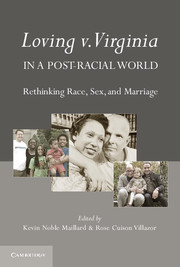Pink and Blue in Black and White: Why Binary, Prescriptive Approaches to Human Categorization Still Won’t Yield the Desired ResultPosted in Articles, Gay & Lesbian, Law, Media Archive on 2012-08-21 02:42Z by Steven |
IIT Chicago-Kent College of Law
Honors Scholars Program
2010
23 pages
INTRODUCTION: SAME-SEX MARRIAGE AND MISCEGENATION
A Texas court asked “can a physician change the gender of a person with a scalpel, drugs and counseling- or is a person’s gender immutably fixed by our Creator at birth?” The Kansas Supreme Court echoed this inquiry. What the Texas Court characterized as a deep, philosophical question. others have called “loaded question.” The court’s framing of the issue previewed its ruling from the opinion’s first page. But the court’s Terminology indicated just how complicated The question was.
The question arose in a suit under Texas’ wrongful death statute. Christie Littleton lost her husband Jonathon in 1996. To have standing as his beneficiary, she had to be his surviving spouse. But Texas law threatened the validity of their marriage. This is because forty-four years earlier. Christie was bom a “physically healthy male” named Lee Cavalos, Jr. Thus the court posed. “[i]f Christie is a woman, she may bring this action. If Christie is a man. she may not.” When Christie was fifteen years old. Texas was one of fifteen states whose anti-miscegenation laws were overturned by the Supreme Court in Loving v. Virginia. In the years prior to this, the majority of states promulgated statutes preventing white people from marrying, or at least procreating, with people of color. In these states, the desire to prevent miscegenation was rivaled only bv the challenge of categorizing the races.
The Littleton opinion showed a court grappling with biological and social factors in an attempt to categorize Christie Littleton. The court framed the issue as determining her gender: male or female. But gender, like race, is a social construction. And like race, while it is heavily associated with biological characteristics, it lacks a true biological definition. Still, these constructions are firmly rooted in our society, and have served as a predicate to social citizenship. This citizenship, or the “status bestowed on those who are full members of a community. has been conditioned on race as well as conforming to a specific set of sexual norms. But the state’s continuous attempts to define its populace, thus regulating its citizens, are as complicated when the categories are male and female as when the categories are black and white…
Read the entire essay here.



